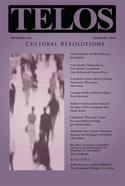Jörg Friedrichs’s “Global Islamism and World Society” appears in Telos 163 (Summer 2013). Read the full version online at the Telos Online website, or purchase a print copy of the issue in our store.
 The piece is an eye-opener on contestation between global Islamism and cosmopolitan world society. It develops a comprehensive understanding of the former as the communitarian mirror image of the latter. Global Islamism and cosmopolitan world society are presented as varieties of globalization. The objective is to understand global Islamism as a political project and to assess its chances of successfully competing against cosmopolitan world society. This is accomplished by a comparative assessment of the degree to which either of them can achieve social integration, which is a prerequisite for the success of any political project. World society thrives on established forms of political and legal integration, and is buttressed by integration via functional subsystems. Global Islamism relies on the expectation of strong communal engagement and the unapologetic exclusion of dissidents and outsiders. It turns out that global Islamism’s bolder discriminatory practices are a two-edged sword because they also lead to internal divisions, and that global Islamism is not stronger than world society with regard to sociability. Insofar as the integration of Muslims into a universal community of believers is even more utopian than the realization of cosmopolitan world society, global Islamism is at a serious competitive disadvantage and thus bound to be frustrated. Until that happens, conflict between global Islamism and world society will continue to pose significant challenges. It is hoped that these challenges may be better managed when both are recognized as rival globalization projects, and when their mutual incompatibilities are acknowledged.
The piece is an eye-opener on contestation between global Islamism and cosmopolitan world society. It develops a comprehensive understanding of the former as the communitarian mirror image of the latter. Global Islamism and cosmopolitan world society are presented as varieties of globalization. The objective is to understand global Islamism as a political project and to assess its chances of successfully competing against cosmopolitan world society. This is accomplished by a comparative assessment of the degree to which either of them can achieve social integration, which is a prerequisite for the success of any political project. World society thrives on established forms of political and legal integration, and is buttressed by integration via functional subsystems. Global Islamism relies on the expectation of strong communal engagement and the unapologetic exclusion of dissidents and outsiders. It turns out that global Islamism’s bolder discriminatory practices are a two-edged sword because they also lead to internal divisions, and that global Islamism is not stronger than world society with regard to sociability. Insofar as the integration of Muslims into a universal community of believers is even more utopian than the realization of cosmopolitan world society, global Islamism is at a serious competitive disadvantage and thus bound to be frustrated. Until that happens, conflict between global Islamism and world society will continue to pose significant challenges. It is hoped that these challenges may be better managed when both are recognized as rival globalization projects, and when their mutual incompatibilities are acknowledged.


